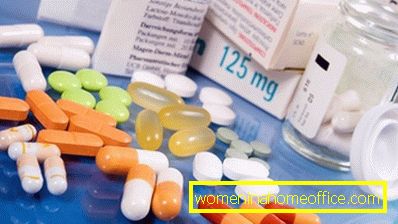Antihistamines for children 4 and other generations. what
Experienced parents know that at the first signs of allergy, antihistamines should be given to children. Usually, the medicine is taken on prescription, but it may happen that it is not possible to visit it in the near future. In such a situation, it is necessary to carefully choose a remedy for atypical reactions of the body, because not all medicines are equally good.
Features of allergic reactions in children

Statistics say that every third family is familiar with childhood allergies. Most often it occurs during the flowering of plants and during the formation of food habits. There are 6 types of allergies:
- food. Specialists at the same time distinguish true food allergies and "pseudo-allergies." The second is related to the wrong lure. A real skin reaction occurs immediately after a meal;
- medicinal. Allergy to medications. It is often confused with the intolerance of a certain drug;
- infectious. Occurs due to the activity of viruses and bacteria that are present in the human body;
- respiratory. Appears in the period when the plants bloom;
- contact (skin). The reaction occurs if the child comes into contact with the allergen;
- caused by the bite of an animal. It can be recognized by the swollen site of damage to the skin and the area around it.
The first signs of an allergy: what to do?
When allergies are manifested, the main task of parents is to prevent the stimulus from entering the internal environment of the body. However, this is not always possible. For a start, you should go to a doctor who will prescribe a specific drug and determine the dosage (!). We strongly recommend to listen to this advice, because literacy therapy in this case is very important and determines the state of health of the child in the present and future.
Today, antihistamines are available in various forms: tablets, suppositories, drops, injections, and syrups. The latter can usually be given to children from 1 month, so they are the best drugs for allergies almost from birth. They should be taken no more than 7 days, after this period the drug itself may begin to act as an allergen.
Antihistamine groups

In total at the moment there are 4 generations of anti-allergy drugs.
- The first generation is represented by means that cause severe drowsiness, which interferes with normal human life. These drugs include diphenhydramine, suprastin, Tavegil.
- The second generation includes drugs that have a slight hypnotic effect, but they can have an effect on the central nervous system and heart, causing arrhythmia. This, for example, Claridol or Clarisens.
- The third generation includes drugs such as Zyrtec, Telfast, Trexil. They do not cause sedation and do not affect the central nervous system.
Antihistamines of the new generation are much more effective than the previous ones: they do not tend to sleep, they do not affect the heart. Means are products of the exchange of drugs released earlier. Compared with the "ancestors" their effectiveness increased by 2-4 times.
4th generation antihistamines
These include the latest medicines, which provide a quick and lasting effect, relieving the symptoms of allergies. They have a minimal effect on the nervous system and other vital organs. These drugs include:
- Desloratadine - in the form of a syrup, it is recommended for children from 1 year. Its action is shown in 30 minutes, and the effect lasts up to a day.
- Claritin - recommended for patients of all age groups, does not cause drowsiness. Children from 2 to 3 years should be given a syrup, then you can go to the tablet form.
- Astemizol is prescribed for children from 1 year old, the effect lasts up to 24 hours.
Antihistamines for children
Antihistamines for children from their birth should be prescribed very carefully, always consulting with an experienced doctor. As already mentioned, it is recommended to purchase medicine in the form of syrup to relieve symptoms of allergy.
In the treatment of this problem in children using drugs of all groups. In pediatrics, 1st generation drugs are used to relieve anaphylactic shock, serum sickness, urticaria, allergic rhinitis. The first generation removes the symptoms most quickly, so its representatives are prescribed for acute manifestations of allergy. These include Suprastin (you can give this antihistamine to even newborns) and Tavegil. But they cause side effects, so with dosages, especially for infants, you should be very careful.
Of the second-generation drugs, ketotifen, Cetrin, Erius are suitable for children, and such drugs are preferably used in the treatment of asthma and atopic dermatitis. The third generation of remedies helps to heal early atopic syndrome and rhinitis; from among his representatives, children are appointed Gismanal and Terfen. The means of the new generation are used for the treatment of chronic allergies, they act on the organism for the maximum time and have no side effects. It includes Telfast and Zyrtec (in exceptional cases it can be given to newborns). In standard situations, they are recommended to be used only from 3 years. The fourth generation eliminates any manifestations of allergy without affecting other organs and systems.
Side effects and contraindications to taking antihistamines

Allergy medications are ideally prescribed only by a doctor.
It is forbidden to take them with gastric ulcer, asthma, bladder obstruction and during antidepressant therapy. To take certain drugs, especially the first generation, pregnant women and children should be approached with particular caution.
All groups of drugs are not recommended to take if you are hypersensitive to a certain component of the drug. Despite their safety, even antihistamines of the new generation can cause side effects, in particular, sleep disorder, anaphylactic shock and others.
Modern allergies are considered highly effective, do not have a sedative effect and do not provoke problems with the central nervous system. However, any medications are not completely safe. Therefore, when an allergic reaction is detected in a child, it is worthwhile to immediately call a doctor, and not try to find a medicine and its dosage yourself.